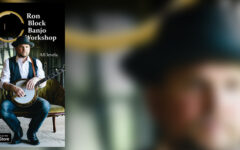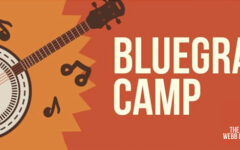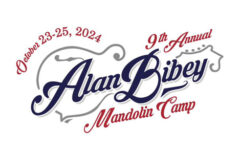David Morris attended Bass Strummit III as the winner of Barry Bales’ Have Bass, Will Travel video contest on Bluegrass Today. Here, he shares his thoughts from the workshop. If you need to reach him, he’s probably practicing.
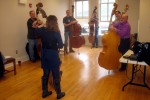 Sorry, honey, but I won’t have much time for household chores this year. I have to spend more time practicing, building up my left hand, using the metronome, listening to more CDs and attending more live shows to help make me a better bluegrass bass player. Missy Raines told me so. So did Barry Bales, Jason Moore and Mike Conner.
Sorry, honey, but I won’t have much time for household chores this year. I have to spend more time practicing, building up my left hand, using the metronome, listening to more CDs and attending more live shows to help make me a better bluegrass bass player. Missy Raines told me so. So did Barry Bales, Jason Moore and Mike Conner.
That quartet, among the most talented upright bassists in any genre, led 18 other players of various skill levels through two days of detailed workshops at Bass Strummit III over the New Year’s weekend. Like most of the other students, after listening to Missy, Barry, Jason and Mike talk and – especially – play, I left Roanoke late Sunday afternoon thinking about how much harder I would need to work to become a better player. Needless to say, most of my resolutions for 2011 are musically focused.
My takeaway from the Strummit boils down to three simple instructions that are now scrawled on an index card on the music stand in my practice room: Play more. Listen better. Don’t be afraid to make mistakes.
 “I think time spent practicing equals confidence,” Missy told one class. Even 15 minutes a day is better than waiting for an hours-long block of time to practice, since that block may never become available. She also advised players not to rush. Practice slowly enough to get it right while using proper technique. Otherwise, the seven-time IBMA bass player of the year said, we’d just be practicing how to make mistakes and reinforcing bad habits.
“I think time spent practicing equals confidence,” Missy told one class. Even 15 minutes a day is better than waiting for an hours-long block of time to practice, since that block may never become available. She also advised players not to rush. Practice slowly enough to get it right while using proper technique. Otherwise, the seven-time IBMA bass player of the year said, we’d just be practicing how to make mistakes and reinforcing bad habits.
Barry, who admits he doesn’t practice as often as he should (but obviously practiced a lot over the years), urged workshop participants to learn new songs and try new approaches in the rehearsal room. “Get out of your comfort zone when you practice,” he said. And listen – REALLY listen – to music and eventually your ear will start to hear the changes.
Barry, who holds down the low end for Alison Krauss and Union Station, is self taught. He described his method of learning as “hunt and peck” until he finds something that works. He still recalls the epiphany that propelled him forward after many hours of noodling and listening and practicing. He was in his grandparents’ house, listening to Your Love Is Like a Flower, on The Bluegrass Album, Vol. 2, when he realized he could pick out the baritone part. Some of the mystery was gone, and much music followed.
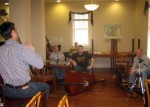 Barry also recommended that we play like we mean it. “Don’t play like you’re afraid somebody’s going to hear you,” he commanded. Jason, who tours with Mountain Heart, said essentially the same thing: “Don’t be timid. You really gotta pull it. You ain’t gonna hurt it.”
Barry also recommended that we play like we mean it. “Don’t play like you’re afraid somebody’s going to hear you,” he commanded. Jason, who tours with Mountain Heart, said essentially the same thing: “Don’t be timid. You really gotta pull it. You ain’t gonna hurt it.”
There was another nugget of knowledge that all four instructors repeatedly stressed during the weekend: Don’t overplay. “Yeah, I know a lot of notes,” Mike said. “But I don’t play a lot of notes. I’m a big believer in less is more.”
We’re all a bit overwhelmed right know by all the knowledge that was crammed into our heads in two short days, and maybe a bit intimidated by the talent we shared practice studios with. After Missy played an elegant solo for five of us, one guy interrupted the hush that followed by saying, “Anybody want a good deal on the used Englehardt?” He was joking, I think, but I know the feeling. I might plug away from years and never approach Missy’s artistry. But I’m going to try, even if it’s just 15 minutes at a time.

